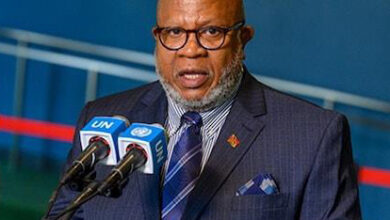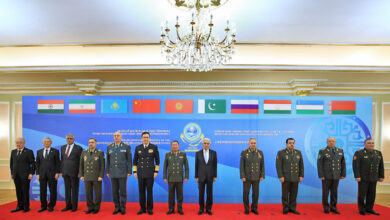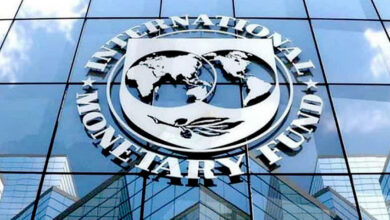INDIA – A Global Growth Engine in Foreseeable Future: Krishnamurthy V. Subramaniam, IMF Executive Director
By R. Anil Kumar
-
Ever since the COVID-19 pandemic, India has witnessed consistent growth at 7 per cent plus- IMF Executive Director
-
In India, pre-2014 (Pre-NDA period), productivity growth annually was 1.3 percent; in contrast, the rate of productivity growth post-2014 (During NDA Government led by PM Narendra Modi) it has been 2.7 per cent, which is more than double-According to Penn World Table’s data
-
India’s GDP grew at a massive 8.4 per cent during the October-December quarter of the current financial year 2023-24, and the country continued to remain the fastest-growing major economy
Washington. India will continue to be a driver for global growth in the foreseeable future said Krishnamurthy V Subramaniam, the Executive Director of the International Monetary Fund (IMF), said on April 16.
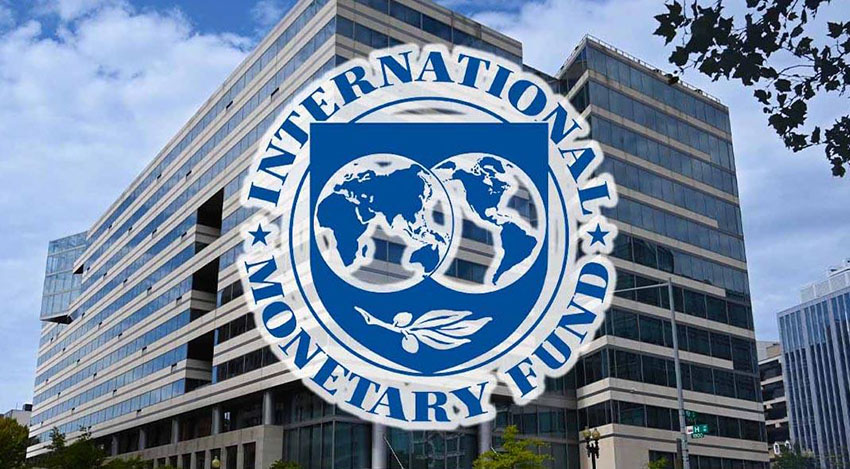
Ever since the COVID-19 pandemic, India has witnessed consistent growth at 7 per cent plus, the IMF Executive Director said and predicted that India will have 8 per cent growth in the fourth quarter and called it “good” growth considering the current global economic situation.
Among the current global economy India, he responded, “I think India will continue to be the driver for global growth in the foreseeable future.
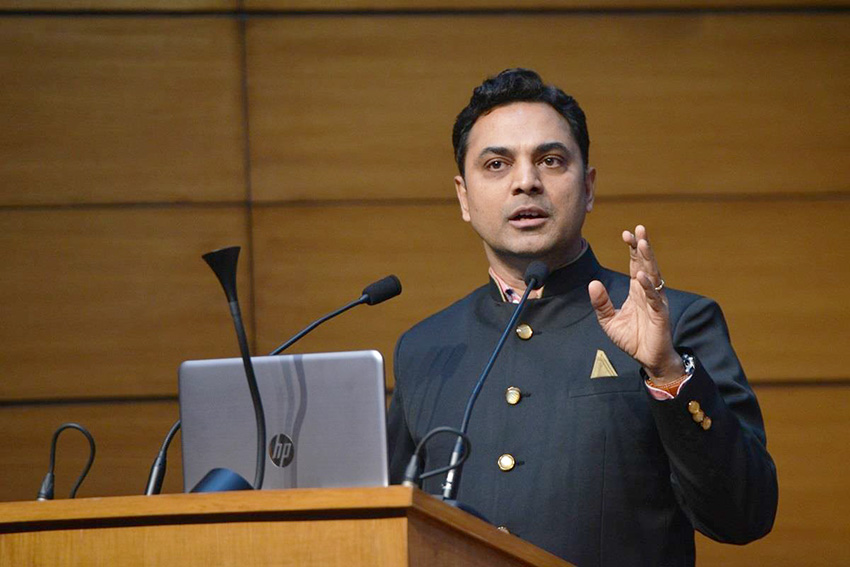
The maximum sort of contributor to global growth. I expect growth in India to be consistently above 7 per cent in this decade. You would recall back in September 2021, when I was with the government, and predicted that India will emerge out of COVID with 7 per cent plus growth, and even now i continue to maintain that assessment, Subramaniam said.
Subramaniam, India’s former Chief Economic Adviser and the current Executive Director IMF , said that the IMF has revised its projection for growth for India in 2024 to 7.8 per cent, which he emphasised reflects overall growth.
Speaking on how India’s economy is viewed in the IMF meetings being held in the US, he said, “If you look at the Indian economy now, ever since COVID, it has grown consistently at 7 per cent plus, 9.7 per cent the year after COVID, then it grew by 7 per cent, and then this year, on a quarterly basis it has shown consistent growth of 8.2 per cent, 8.1 per cent, and 8.4 per cent growth in the first three quarters.
Even with a much lower 7.3 per cent growth, if it so happens, actually in the fourth quarter, India will have an average of 8 per cent growth. And I think that is very good in the current global economic situation. As I said, 3.1 per cent expectation for the global economy.”
“Now, the IMF itself has revised its projection for growth for India for this year to 7.8 per cent, which is reflecting the overall growth. I do want to also mention, I think, if you look at productivity improvements, this is something that is really important.
If you look at the Penn World Table’s data, which is actually what economists use across the world to understand the drivers of growth; In India, pre-2014 (during UPA government), productivity growth annually was 1.3 percent; in contrast, the rate of productivity growth post-2014 (during NDA government led by PM Narendra Modi) it has been 2.7 per cent, which is more than double.
And I think that is a very important driver for growth to continue to be high, and for it to be sustainable going forward,” he added.
India’s GDP grew at a massive 8.4 per cent during the October-December quarter of the current financial year 2023-24, and the country continued to remain the fastest-growing major economy.
The Indian economy grew 7.8 per cent and 7.6 per cent during the preceding two quarters – April-June and July-September, according to data released by the Ministry of Statistics and Program Implementation in February this year.
On critics’ opinions about India’s economy, he referred to two former chief statisticians’ remarks regarding the Indian economy. He said that Pranab Sen and TCA Anant, in an interview, had mentioned that there was nothing to worry about India’s GDP.
“I would say two things. Firstly, if you look at the commentary given by statistical experts, there was an interview of two former chief statisticians, Pranab Sen and TCA Anant, and one former chairman of the National Statistical Commission, PC Mohanan, all of whom were asked about some of the economists’ criticism of the GDP methodology and GDP numbers and they were unanimous that there is nothing to worry about or nothing to sort of that is untoward about the GDP number. So, I think that is so statistical experts that are across the spectrum saying that the GDP numbers can be trusted. I think I would go by that; let me also add my own assessment,” he said.
Lauding India’s digital infrastructure, he stressed that it is an important lesson for the Global South. He recalled his visit to India and said that he used digital modes of payment for buying vegetables at the local market with his mother. He noted that local vendors are accepting digital payments in India. He stressed that digital infrastructure in India is an important lesson for the Global South and it has been created as a public good.
“This is an aspect, especially at the IMF board, that really gladdens my heart. If you look at how digital transactions are done in India, you can use your phone to pay for a glass of coconut water or a coffee, or even if, a few months ago, I was actually with my mom and went for some shopping, basically for vegetables, in the local mandi, and I pulled out my phone and I was able to pay, so it’s just become so widespread and everybody is using one.
“That’s the kind of widespread use of digital payments that has basically happened. And that’s what is reflected in the IMF’s being very appreciative of the kind of infrastructure that has been created. One critical aspect, and these are actually important lessons for the Global South, is that this digital infrastructure has been created as a public good. The sovereign has created it rather than allowing or requiring the private sector to create it. What that means is that when the private sector creates such infrastructure, it can become a monopoly and therefore the prices may not be affordable for everybody. In contrast, the sovereign Indian government creating this access has been widespread. And I think that’s a very important lesson for the Global South,” he added.
He said that Prime Minister Narendra Modi has said that India is willing to share its knowledge about digital infrastructure with other nations. He stated that the use of digital infrastructure for remittances globally can reduce time and have enormous efficiency gains.
He said, “I think the Honourable Prime Minister has been on record saying that India is more than happy to actually share the knowledge from this with all the countries, including the advanced economies.
For instance, there are a lot of remittances, and I think the use of this digital infrastructure for remittances globally can actually reduce not really, not only the time but even the cost for this and I think that can be enormous efficiency gains for the global economy so not only the Global South but even advanced economies can I think learn from India on this aspect.”
Asked about concerns regarding the geopolitical situation and crisis in West Asia, he said, “I think the current meetings come at a time when the economy can express some cautious optimism about it. If you look at the projections for global growth, compared to 3.1 per cent, which was a projection in January, the IMF has revised them 10 basis points higher to 3.2 per cent. So, there is some cautious optimism.”
“I think the situation in West Asia is still evolving, and overall, the impact of that on global growth is something that will be difficult to predict. My sense is that, compared to, for instance, the war in Europe, which had significant implications for the supply side, the impact directly on the economy, I think, will be lower. It does add uncertainty for sure, but unlike in the case of the war in Europe, there won’t be a direct impact on aggregate supply or demand in the global economy. So, I would continue to be cautiously optimistic about the current global economic situation,” he added.
Notably, Israel has launched a counter-offensive against Hamas after the terrorist group launched an all-out attack on Tel Aviv on October 7. Israel has vowed to destroy Hamas. Amid the ongoing war between Israel and Hamas, Iran has launched a series of strikes on Israel in retaliation for a suspected Israeli attack on the Iranian consulate in Damascus, Syria, earlier this month.
Lauding the growth of the Indian economy, he said that the Indian economy is doing very well.
In terms of the overall state of the economy, “India seems to be clearly the star there,” he added.


